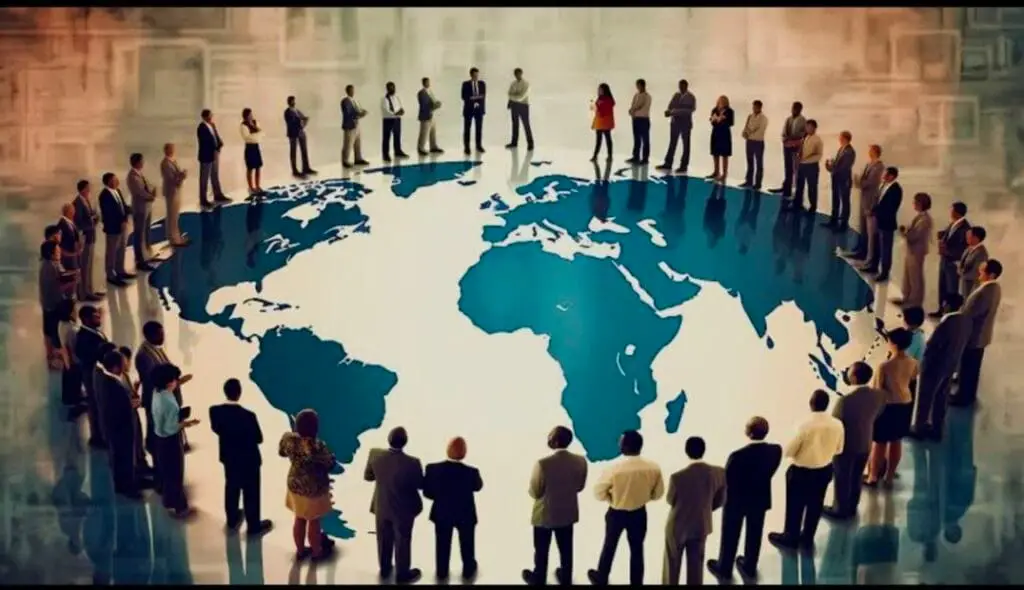
Definition of Globalization
Globalization is the process by which countries, economies, cultures, and societies become interconnected and interdependent through the flow of goods, services, information, ideas, technology, and people across national borders. It is characterized by the increasing integration of global markets, communication, and cultural exchange, leading to a more interconnected world.
Features of Globalization

- Economic Integration :
- Globalization fosters greater economic interdependence between countries. This is achieved through free trade agreements, international investments, and global supply chains.
- Example: Trade blocs like the European Union (EU) and North American Free Trade Agreement (NAFTA) promote economic cooperation among member states.
- Free Movement of Goods and Services :
- Globalization reduces trade barriers such as tariffs and import quotas, making it easier for goods and services to flow freely between countries.
- Example: World Trade Organization (WTO) agreements encourage the reduction of tariffs globally.
- Technological Connectivity :
- Advances in communication technologies, such as the internet, mobile phones, and social media, have made it easier for people and businesses to connect across the globe.
- Example: Video conferencing tools like Zoom and Skype allow real-time communication between individuals and companies worldwide.
- Cultural Exchange :
- Globalization promotes the exchange and fusion of cultural ideas, values, traditions, and practices, leading to a more multicultural world.
- Example: The global popularity of entertainment like Hollywood movies, K-pop, and international cuisine showcases the blending of cultures.
- Multinational Corporations (MNCs) :
- Globalization has facilitated the rise of multinational corporations, which operate in multiple countries, influencing local economies and creating global supply chains.
- Example: Companies like Apple, Nike, and Toyota operate in various countries, producing and selling products worldwide.
- Global Financial Markets :
- Globalization connects financial markets across countries, allowing capital to move freely around the world. International investments, stock markets, and currency exchanges play a central role in global economic activity.
- Example: The New York Stock Exchange (NYSE) and London Stock Exchange are key players in the global financial system.
- Global Supply Chains :
- Products are often designed, manufactured, and assembled in multiple countries, with different regions specializing in different stages of production. This results in interconnected global supply chains.
- Example: The production of smartphones involves sourcing components from countries like China, Japan, and South Korea.
- Labor Mobility :
- Globalization encourages the movement of workers across borders, often in search of better employment opportunities or living conditions.
- Example: Migrant workers moving from developing countries to developed nations in sectors like construction, agriculture, or healthcare.
- Spread of Knowledge and Innovation :
- The exchange of knowledge, research, and technology across borders accelerates innovation and development. Universities, think tanks, and corporations collaborate internationally on research and development (R&D).
- Example: International collaborations in medicine and the development of global scientific projects like space exploration.
- Political and Regulatory Coordination :
- Globalization requires political cooperation on global issues like climate change, international trade, and human rights. This leads to the creation of international institutions and agreements to address global challenges.
- Example: The United Nations (UN) and global agreements such as the Paris Climate Accord address issues that affect the entire world.
- Environmental Impact :
- While globalization promotes economic growth, it also raises concerns about environmental sustainability due to increased industrialization, deforestation, and pollution.
- Example: Global environmental challenges like climate change and biodiversity loss are often linked to the spread of industrial practices.
- Consumerism and Global Brands :
- Globalization has led to the emergence of global brands, with consumers around the world having access to similar products and services, creating a more homogenized consumer culture.
- Example: Global brands like Coca-Cola, McDonald’s, and Starbucks are available in almost every corner of the world.
Conclusion
Globalization is a multifaceted process that touches on various aspects of modern life, from economic integration to cultural exchange. It has reshaped the world, creating opportunities for innovation, trade, and growth, but also presents challenges such as inequality, cultural homogenization, and environmental degradation.
